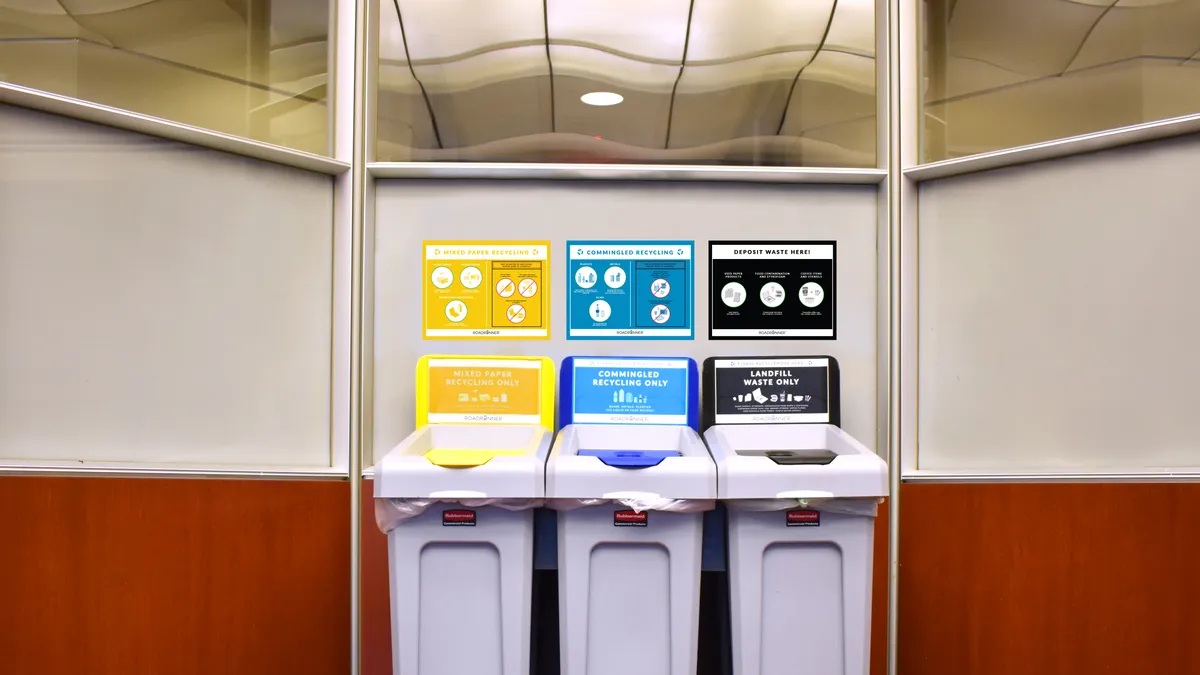Dive Brief:
- RoadRunner Recycling, a Pittsburgh-based startup, recently announced $28.6 million in Series C funding co-led by the firms e.venture and Greycroft. This will enable the company's expansion into 10 new cities starting with Austin, Texas, in June after a slightly delay due to the pandemic. Expansions into Phoenix and San Diego are now targeted for later in the year.
- The technology company expects to double its Pittsburgh staff to 320 people or more and eventually reach 20 markets in total. RoadRunner currently services more than 5,000 customers in Pittsburgh, Philadelphia, Washington, D.C., Baltimore, Cleveland, Chicago, Detroit, Houston, Dallas and San Antonio, Texas.
- Utilizing a "clean stream" source-separated approach, RoadRunner says it has seen an average 8.6 ton annual increase per location compared to previous service providers. “We’re increasing recycling rates [for] our customers in almost every case, because either the material is currently going to landfill or it might have previously been in a single stream," CEO Graham Rihn told Waste Dive last week.
Dive Insight:
While the company's expansion plans remain on track as of publication, albeit with a delay, the COVID-19 pandemic has had a clear effect. During the initial weeks, it largely posed an operational challenge for changing routing, and in some cases helping obtain personal protective equipment for hauling partners. As of last week, Rihn did not report any notable issues with MRF closures affecting business. The broader challenge, as has been the case for all waste and recycling service providers, is adapting to volume changes in different sectors.
“Hotels, hospitality, food service, event centers, pretty much overnight those volumes ceased and all of that generation really shifted to home and healthcare," he said, noting the effects were also clear from a geographic standpoint. "This definitely [happened] a lot sooner in the Northeast and Mid-Atlantic region than it [did] in the Texas-Southeast area.”
Another factor RoadRunner has seen, which tracks with broader residential volume increases but hasn't been discussed as widely, is shifting pressures on multi-family buildings. Depending on local regulations, it is common for apartment and housing complexes to manage their own collection services. With many more people now at home, and some residents facing income challenges, building managers have been under pressure.
"They’ve had a pretty massive reduction in revenue at the same time when a lot of their operating expenses are increasing," said Rihn, adding that while the company is cognizant of financial pressures he believes the best choice is for customers to adapt rather than potentially pay fees for material that doesn't fit in containers. “It’s in their best interest to increase service to accommodate the volumes, because as a rule of thumb they would be paying more on a unit basis than if they just have excess outside."
Founded in 2014, RoadRunner is the latest in a new class of service providers to enter the industry in recent years. Broadly similar to the likes of Rubicon Global or Recycle Track Systems, the company's primary asset is its technology, while actual collection is done by a network of third-party haulers. In RoadRunner's case, that can include vehicles as small as a cargo van and as large as heavy duty trucks.
Different than many in the industry, the company does not prioritize single-stream collection. Unless a location is especially large, and requires a certain type of collection as a result, RoadRunner's preferred approach is to avoid compaction vehicles to maintain material quality. Using its technology for a proprietary city study, the company develops an understanding of how waste stream compositions differ among generators and where opportunities may be due to local ordinances or other factors. The long-term strategy is to capitalize on this information by scaling the platform further.
Rihn said this happens in two ways, first "by expanding our geographical footprint" into new cities. The second way is to "get more and more customers and increase the economies of scale, which make it easier and easier to recycle small volumes of loose material."















